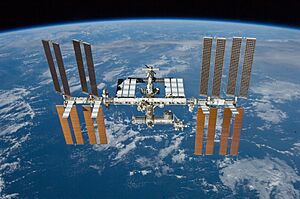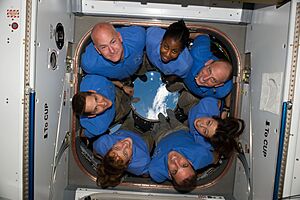Psychological and sociological effects of spaceflight facts for kids
When humans travel into space, especially for long trips, it's not just about the rockets and technology. It's also really important to understand how space travel affects people's minds and how they get along with each other. This is called the psychological and social effects of space flight.
Imagine a trip to Mars! It could take two to three years. Astronauts would be far from Earth with a small crew of four to seven people. Even shorter trips, like flying past Mars, could take about 1.5 years with just two people. Some even talk about one-way trips to Mars!
Before we can send people on such long journeys, scientists need to solve many problems. These include challenges with technology and how the human body reacts to space. But there are also many important questions about how astronauts will behave and feel. Space agencies like NASA are studying these mental and social challenges to make sure future missions are safe and successful.
Contents
How Space Affects Astronauts' Minds and Feelings
Scientists have done studies to learn about how astronauts feel and interact during their time on the Mir space station and the International Space Station (ISS). They studied both the astronauts in space and the people working at mission control on Earth.
One study looked at 13 astronauts and cosmonauts (Russian astronauts) and 58 mission control staff. Another study on the ISS involved 17 space travelers and 128 people on Earth. In both studies, everyone filled out weekly questionnaires about their mood and how well the group was working together.
Here's what they found:
- Sometimes, astronauts in space would show their stress or negative feelings towards the mission control team on Earth.
- The commander's role in supporting the crew was very important for helping the team stick together.
- Astronauts often understood different cultures better than the mission control staff.
- Russian team members were more flexible with languages than Americans.
- Americans felt more work pressure than Russians, but Russians reported more tension on the ISS.
- Overall, moods and team feelings didn't get worse over time, even during the second half of the missions. This goes against an idea called the "3rd quarter phenomenon," which suggests things get harder halfway through.

Other studies have also taught us a lot:
- Researchers looked at how astronauts talked and what they valued. They found that over time, isolated groups in space or in space-like environments on Earth talked less with outside people. They also filtered what they said, which was called "psychological closing."
- Sometimes, crew members interacted less with certain mission control staff, seeing them as "opponents." This tendency for some crew members to become more focused on themselves was called "autonomization."
- Astronauts became closer by spending time together, like celebrating birthdays. But having smaller groups or "outsiders" (like scapegoats) could hurt team spirit.
- A study of 12 Russian cosmonauts on the ISS showed that their personal values usually stayed the same. They valued doing their job well and having good social relationships the most.
Cultural Challenges in Space
Another study surveyed 75 astronauts and cosmonauts and 106 mission control staff about cultural problems. The biggest problem they reported was difficulty coordinating between different space organizations. Other issues included misunderstandings in communication and different ways of managing work.
In a survey of 11 Russian cosmonauts, they talked about possible problems on a Mars trip. They rated these factors as very important:
- Feeling isolated and bored.
- Delays in communication with Earth due to the long distance.
- Leadership issues.
- Differences in how space agencies manage things.
- Cultural misunderstandings within international crews.
A survey of 576 employees at the European Space Agency (ESA) found that more cultural diversity could make it harder for people to interact. Leadership and decision-making were especially important factors here.
Astronauts' Daily Lives and Feelings
One study looked at the personal journals of ten ISS astronauts. They found that most entries (88%) were about: Work, Outside Communications, Adjustment, Group Interaction, Recreation/Leisure, Equipment, Events, Organization/Management, Sleep, and Food.
Astronauts generally reported that life in space wasn't as hard as they expected before launch. However, they did notice a 20% increase in problems with other people during the second half of their missions. It was suggested that future crew members should be allowed to control their own schedules as much as possible.
Mental Health After Space Travel
Some astronauts have reported mental health issues during or after their missions.
- Most common are "adjustment reactions" to being in space, which can include feeling anxious or sad for a short time.
- Sometimes, emotional stress can show up as physical symptoms, like headaches or stomach aches.
- Serious mental illnesses like schizophrenia or manic-depression have not been reported. This is likely because astronauts are carefully checked for these conditions before they fly.
After returning to Earth, some space travelers have experienced changes in personality and emotional problems. These can include anxiety, depression, and difficulties adjusting to married life. Some have even needed therapy or medication. Some astronauts also found it hard to adjust to the fame and media attention after their missions. Similar problems are likely to happen after big expeditions like a trip to Mars.
Positive Experiences in Space
Being in isolated and confined environments can also lead to positive experiences. A survey of 39 astronauts and cosmonauts found that all of them reported positive changes from flying in space. One big positive was their view of Earth. They gained a much stronger appreciation for the Earth's beauty.
Since the early 1990s, researchers have also looked at the "growth-enhancing" parts of space travel. One study analyzed the published stories of 125 space travelers. After returning from space, they reported:
- A greater appreciation for other people and nature (called Universalism).
- Increased Spirituality.
- A stronger sense of Power.
Russian space travelers scored higher in Achievement and Universalism, and lower in Enjoyment, compared to Americans. Overall, these results suggest that traveling in space can be a positive and growth-enhancing experience for many astronauts.
From Earth Orbit to Deep Space Missions
Most of what we know about how space affects people comes from missions in low Earth orbit (close to Earth). But a long, multi-year mission to a near-Earth asteroid or to Mars will be very different.
New kinds of stress will appear because of the huge distances:
- Astronauts will be much more independent from mission control on Earth. They will need to plan their own work and solve problems by themselves.
- They are expected to feel very isolated as Earth becomes a tiny, bluish-green dot in the sky. This is called the "Earth-out-of-view phenomenon."
- From the surface of Mars, it will take up to 44 minutes for a message to go to Earth and back. Communication channels will also be slow, adding to the feeling of isolation.
The Mars 500 Program
From June 2010 to November 2011, a special study called the Mars 500 Program took place. It was a simulation on Earth designed to copy a 520-day round trip to Mars. Six men lived in a simulator in Moscow. They had living and lab areas, and even a mock-up of the Mars surface for simulated activities.
During this mission, the crew had periods where they were very independent and experienced communication delays, just like on a real Mars trip.
- A pilot study before the main mission found that when the crew could plan their own schedules (high work autonomy), they liked it, and mission goals were met.
- During these times, the crew's mood and self-direction improved. However, mission control staff felt more anxious and confused about their roles.
Several studies were done during the actual 520-day mission:
- The crew's sense of time changed.
- Crew tension sometimes shifted to mission control.
- Astronauts asked for less help during periods of high independence, showing they had adapted.
- The crew became more similar in their values and less likely to show negative feelings to each other, which could lead to "groupthink" (where everyone agrees to avoid conflict).
- Crew members felt more lonely and less supported by colleagues over time, which affected their thinking and ability to adapt.
- Researchers also found differences in sleep patterns, mood, and conflicts with mission control among the crew members.
Challenges for a Real Mars Mission
There are many mental and social challenges for a real mission to Mars:
- Crew Selection: Only a few astronauts will want to be away from family and friends for two to three years. This might mean the available crew members have certain psychological traits that are not yet understood.
- Unknown Effects: We don't know much about the long-term physical and mental effects of very low gravity and high radiation in deep space. On Mars, the gravity is only 38% of Earth's, and its effect on well-being is unknown.
- Independence: The crew must be very independent, creating their own schedules and solving emergencies by themselves.
- Medical Emergencies: They must be able to handle medical and mental health emergencies, like injuries or extreme stress.
- Resources: Basic supplies like water and fuel might need to be found on Mars itself.
- Leisure Time: There will be a lot of free time, especially during the long journey to and from Mars. Finding meaningful ways to spend this time will be a challenge.
On missions closer to Earth, astronauts get support like real-time family calls, frequent talks with mission control, and gifts sent on supply ships. These things help with isolation and loneliness. But for a Mars mission, communication delays and the inability to send supplies quickly will make these strategies hard to use. New ways to support the crew will be needed.
Finally, seeing Earth's beauty has been a major positive for astronauts. But on a Mars trip, Earth will look like an tiny, insignificant dot. This might make feelings of isolation, homesickness, sadness, and irritability worse. Having a telescope on board to view Earth might help the crew feel more connected to home.
See also
- Space psychology
- Central nervous system effects from radiation exposure during spaceflight
- Colonization of Mars
- Effects of sleep deprivation in space
- Fatigue and sleep loss during spaceflight
- Mars Analog Habitats
- Overview effect
- Space colonization
- Skylab 4
- Team composition and cohesion in spaceflight missions
 | Ernest Everett Just |
 | Mary Jackson |
 | Emmett Chappelle |
 | Marie Maynard Daly |


